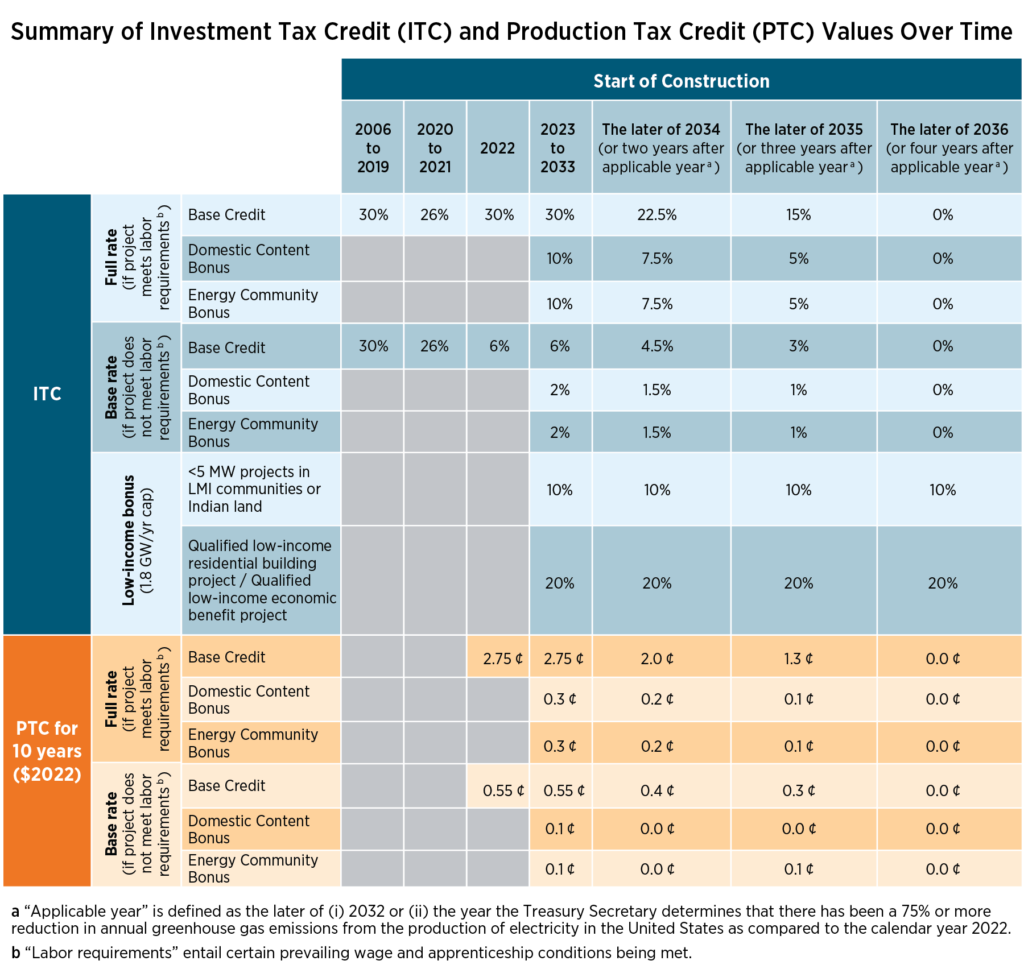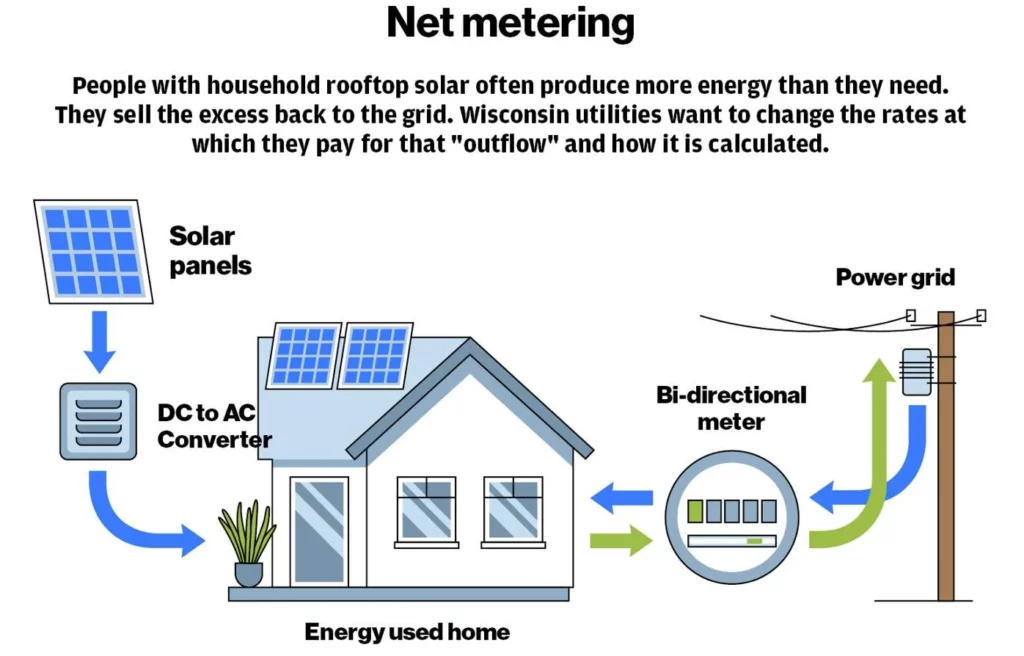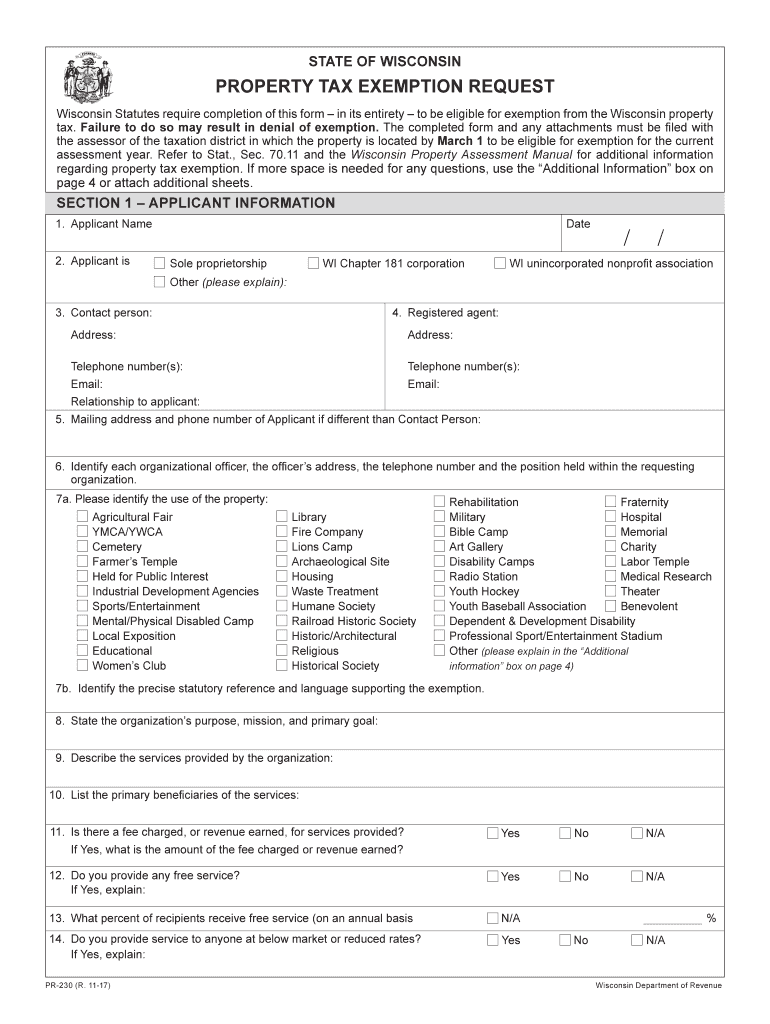Numerous commercial solar incentives and rebates are available at county, state, and federal levels in most US states. In Wisconsin, despite its long winters, these incentives & rebates have the potential to offset the upfront cost of setting up a solar system up to 70% throughout its lifetime. While the processes for commercial solar incentives Wisconsin offers can be intricate, difficult, and time-consuming, Commercial-Solar.org makes the process easy. You can speak with our expert today to know which incentives and rebates are available for you, how much they can save you, and how you take advantage. We have also carefully curated some of the best commercial solar incentives in Wisconsin, see which one you qualify for below.
Renewable Electricity Production Tax Credit (PTC)

ITC and PTC
The production tax credit is administered by the Internal Revenue Service (IRS) and provides a per-kilowatt-hour tax credit for electricity generated by eligible renewable energy systems during the first 10 years of operation. Unlike the ITC which provides an upfront tax credit based on the cost of the system, the PTC offers a more attractive cash flow over time, as the tax credits are earned based on electricity generation. As a commercial solar incentive, Wisconsin businesses that take advantage of the PTC can save up to 30% in their upfront cost in 10 years.
To be eligible, the solar system cannot be leased to tax-exempt entities, although tax-exempt entities can receive the PTC directly as payment. Solar systems placed in service in 2022 or later and beginning construction before 2033 qualify for a PTC of 2.75 ¢/kWh. Eligibility requirements set by the Treasury Department must be met to qualify for the PTC.
The PTC, along with associated bonuses, begins to phase out for projects commencing construction in 2032 or after achieving a significant reduction in annual greenhouse gas emissions. Unused tax credits related to the project may be carried back or forward for a certain number of years. Tax equity financing provides an opportunity for businesses to partner with investors to utilize federal tax benefits for solar systems. To claim the PTC, taxpayers must complete and attach IRS Form 8962 to their tax return. Instructions for completing the form are available on the IRS website.
Business Investment Tax Credit (ITC)
Since the investment tax credit was enacted in 2006, it has been one of the most lucrative mechanisms for the growth of green energy across the country, even for a state like Wisconsin with lower sunlight. With its most recent extension in 2022, supplemented by new provisions, the ITC underscores its significance in driving innovation and competitiveness within the business sector.
For businesses, the ITC offers a substantial tax credit of up to 30% when they invest in solar energy systems. This incentive serves as a compelling driver for organizations looking to reduce operational costs while enhancing sustainable initiatives. Furthermore, businesses can capitalize on additional credits by adhering to specific criteria, such as utilizing domestically manufactured components or situating solar installations strategically.
Modified Accelerated Cost-Recovery Systems (MACRS)
The MACRS is a corporate depreciation incentive for businesses in Wisconsin. The program was first established in 1986 and has seen many extensions since. Under this program, businesses may recover investments in certain properties through depreciation deductions.
The MACRS sets class lives for different property types, ranging from three to 50 years, for depreciation purposes. Many renewable energy technologies fall under the five-year property classification. The 5-year schedule for most solar properties has been effective since 1986.
Bonus Depreciation, available sporadically at varying levels, was increased to 100% for qualified property acquired and placed in service after September 27, 2017, and before January 1, 2023, by The Tax Cuts and Jobs Act of 2017. Historical bonus depreciation provisions include the 50% first-year bonus depreciation enacted in 2008, extended and amended multiple times until December 31, 2014, by subsequent acts like the American Recovery and Reinvestment Act of 2009 and the Tax Relief, Unemployment Insurance Reauthorization, and Job Creation Act of 2010.
Keynote: The Tax Cuts and Jobs Act of 2017 increased bonus depreciation to 100% for qualified property acquired and placed in service after September 27, 2017, and before January 1, 2023. Bonus depreciation steps down by 20% each year beginning with 80% in 2023
Net Metering in Wisconsin

Net Metering in Wisconsin
In 1982, the Public Service Commission of Wisconsin (PSC) issued an order that required all regulated utilities to file tariffs allowing net metering to customers that generate electricity with systems up to 20 kilowatts (kW)* in capacity. Today, net metering in Wisconsin allows customers with renewable energy systems to receive credit for excess electricity generated and fed back into the grid. The program is designed to help customers offset their electricity costs by exporting surplus energy to the utility and provides unique commercial solar incentives for Wisconsin businesses.
As of 2024, Wisconsin’s net metering policies vary depending on the utility company and system size. For investor-owned utilities like We Energies and Alliant Energy, net metering is available for systems up to 100 kW for commercial customers. These customers receive retail-rate credits for excess electricity exported to the grid, which offsets any future electricity bills. However, larger systems may be subject to different compensation mechanisms, such as avoided cost rates or other tariffs. Additionally, certain cooperatives and municipal utilities may have their own net metering policies, which could differ from those of investor-owned utilities.
How to Enroll in Net Metering in Wisconsin
There are quite several Investor-owned and municipal utilities in Wisconsin, each with its enrollment policy. However, in Wisconsin, under the current structure, commercial customers with large systems receive 7.5 cents per kilowatt-hour generated into the grid. This is significantly lower than that of residential customers according to Docket 3279-UR-125. You can find specific enrollment procedures on the utility website. You can also find an updated listing of all utility tariffs on the PSC website.
Request a Commercial Solar Proposal for Your IL Business
Additional Local Commercial Solar Incentives Wisconsin: Incentives and Rebates
The solar industry in Wisconsin is currently worth $1.6 billion and ranked 25th in cumulative solar energy capacity in 2023 due to its limited solar potential. However, regardless of its rather small industry, the state still strives to increase its state solar generation to 10% in the next 10 years. To achieve this, there are several residential and commercial solar incentives Wisconsin has to offer to buff up its solar capacity. Here are a few to look out for.
Wisconsin Property Tax Exemption

Wisconsin Property Tax Exemption Form
Wisconsin’s Property Tax Incentive program is administered by the Wisconsin Department of Revenue and is one of the foremost state commercial solar incentives Wisconsin offers. The program offers a 100% exemption from general property taxes on the value added by eligible renewable energy systems. This exemption covers solar and wind systems and benefits commercial and industrial customers. The incentive applies irrespective of whether the renewable energy equipment is classified as real property or personal property. Property owners can access a fact sheet detailing this exemption and the request form through the Wisconsin Department of Revenue’s website. To apply for the exemption, property owners must submit a request to their local assessor by March 1st following the January 1st assessment date for which the exemption is sought.
Keynote: Exemption does not apply to certain properties within tax increment financing districts existing before January 1, 2014, until the district terminates.
Focus Energy Commercial Solar Rebate Program
Focus on Energy is a state residential and commercial solar incentive Wisconsin businesses can utilize within the state. The program provides businesses with the potential to receive a maximum incentive of $50,000, providing substantial financial support for solar energy initiatives. Unlike residential rebates, which stand at a fixed rate, commercial incentives are calculated based on the system’s capacity, offering a tiered structure to encourage larger installations.
For commercial customers, the rebate starts at $200 per kW for the initial 5 kW of the solar electric system. As the system’s capacity increases, the rebate per kW decreases gradually. Specifically, customers receive $150 per kW for capacities between 5 and 10 kW, $125 per kW for capacities between 10 and 100 kW, $100 per kW for capacities between 100 and 300 kW, and $85 per kW for capacities between 300 and 500 kW. Furthermore, agricultural producers classified as business customers are eligible for matching incentives of up to $10,000, further incentivizing the adoption of solar technology within the agricultural sector.
The program’s approach ensures fairness and efficiency, offering incentives on a first-come, first-served basis while funds are available. Businesses interested in harnessing these incentives can access additional program details and application materials on the program’s official website, facilitating a streamlined process for participation and maximizing the potential for cost savings and environmental impact.
Riverland Energy Cooperative – Commercial, Industrial, and Agricultural Energy Efficiency Rebate Program in Wisconsin
Riverland Energy Cooperative offers a commercial, industrial, and agricultural energy efficiency rebate program tailored to Wisconsin businesses and agricultural producers who are its members. This initiative provides guaranteed loan financing and grant funding to facilitate renewable energy systems and energy efficiency improvements. Eligible applicants include agricultural producers deriving at least 50% of their gross income from agricultural operations, as well as small businesses located in eligible rural areas. Businesses must meet Small Business Administration size standards and have no outstanding delinquent federal taxes, debt, judgment, or debarment to qualify.
Loan guarantees can cover up to 75% of total eligible solar project costs, with grants available for up to 50% of total eligible project costs. Agricultural producers and small businesses can receive combined grant and loan guarantee funding of up to 75%. Projects must demonstrate technical merit and utilize commercially available technology, with energy efficiency projects requiring an energy audit or assessment. To apply, interested parties can submit applications year-round at their local office during these periods in 2024: December 31, 2023, March 31, 2024, June 30, 2024, and September 30, 2024.
Solar Potential in Wisconsin: Incentives and Savings
Wisconsin is recently coming through into solar energy capacity despite its long winters. This is evident in its evolving solar policies, complemented by initiatives like net metering and the various incentive programs currently paving the way for a vibrant solar energy landscape.
The Badger state ranks around the average for the peak sun hours per day, averaging 4.85 hours per day during summer and 3.28 hours per day during winter. Currently, the state only generates 2.32% of its electricity with solar. However, the various commercial solar incentives Wisconsin businesses & residents now enjoy, mashed up with the affordability of solar panels in the Badger state, and the number is projected to reach 10% in the next 10 years. This means that this is as good a time as any other to choose solar energy investment.
Understanding the Electric Utility Landscape and Rates in Wisconsin
Wisconsin achieved its first renewable energy target in 2015. This was its goal to reach a 10% total energy generation by renewable energy. While there hasn’t been a specific update to its new target through the RPS, the recent executive order signed by the state’s governor sets a new ambitious goal of achieving 100% emission-free electricity production by 2050. This underscores Wisconsin’s commitment to transitioning towards cleaner and more sustainable energy sources in the coming decades. Now, while Wisconsin customers currently pay 4% less than the national average on electricity bills, commercial customers still spend over $800 monthly. As the 25th highest solar generator, Wisconsin commercial customers can pay even less by going solar.
Impact on Solar Energy Decisions
The impact of choosing solar can often be financial due to the various state and federal commercial solar incentives Wisconsin offers. However, choosing solar also offers environmental benefits. Furthermore, you can choose solar without having to worry about the upfront cost which is one of the biggest hurdles for commercial customers. Ready to get started with your solar journey? Speak to one of our experts to guide you into saving thousands on electricity bills for a lifetime.
Are Solar Panels Worth It in Wisconsin?
With average peak sun hours of 4.29 hours per day, year-round Wisconsin is a favorable state for solar panel investment. Also, with the affordable cost of solar panels and the numerous financial incentives offered, taking advantage of solar panels in Wisconsin only makes sense. Again, you can potentially save up to 80% of the cost of setting up a system using the right solar company like commercial-solar.org, and keep all the benefits.
Why choose Commercial-Solar.org for your commercial solar project in Wisconsin?
Embark on a sustainable journey with Commercial-Solar.org, where over two decades of expertise meet cutting-edge solar solutions. We’re not just a solar provider; we’re your partner in unlocking the full benefits of the numerous commercial solar incentives Wisconsin offers. Here’s why choosing us is the best decision for your business:
- Effortless Transition: From initial consultation to final installation, we ensure a smooth and straightforward process, making your shift to solar as seamless as possible.
- Maximize Wisconsin Incentives: Our expertise in Wisconsin’s commercial solar landscape means we navigate and maximize state-specific incentives for you, ensuring unparalleled financial savings.
- Zero Initial Cost: Dive into solar without upfront costs. Our strategic approach covers installation expenses through Wisconsin’s generous incentives, making solar accessible for all businesses.
- Long-Term Savings: Leverage solar energy to significantly reduce your electricity bills, ensuring a sustainable and profitable future for your business.
- No Capital Investment Required: Transition to solar without the need for capital expenditure, allowing you to invest in your business’s growth while we handle the solar transition.
- Construction Costs Covered: Forget about the financial burden of construction costs. We take care of it, letting you focus on enjoying the benefits of solar energy.
- Full Ownership Benefits: Gain complete control over your solar solution with 100% ownership, avoiding the limitations of traditional power purchase agreements (PPAs).
At Commercial-Solar.org, we’re dedicated to transforming businesses in Wisconsin through solar energy, offering tailored solutions that meet your unique needs. Whether you’re a small family business or a large corporation, our team of experts is here to guide you every step of the way toward a greener and more cost-effective future today.
Other Information |
|
| Areas Serving: | Milwaukee, Madison, Green Bay, Kenosha, Racine, Appleton, Waukesha, Eau Claire, Oshkosh, Janesville, West Allis, La Crosse, Sheboygan, Wauwatosa, Fond du Lac, Brookfield, New Berlin, Wausau, Greenfield, Franklin, Beloit, Oak Creek, Sun Prairie, Manitowoc, West Bend |
|---|---|
| Services | Commercial Solar Installation
|
| Company Logo: |  |